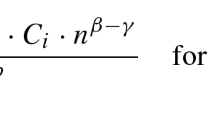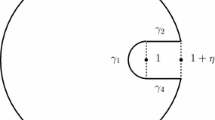Abstract
In this paper we study random partitions of {1,…,n} where every cluster of size j can be in any of w j possible internal states. The Gibbs (n,k,w) distribution is obtained by sampling uniformly among such partitions with k clusters. We provide conditions on the weight sequence w allowing construction of a partition valued random process where at step k the state has the Gibbs (n,k,w) distribution, so the partition is subject to irreversible fragmentation as time evolves. For a particular one-parameter family of weight sequences w j , the time-reversed process is the discrete Marcus–Lushnikov coalescent process with affine collision rate K i,j = a+b(i+j) for some real numbers a and b. Under further restrictions on a and b, the fragmentation process can be realized by conditioning a Galton–Watson tree with suitable offspring distribution to have n nodes, and cutting the edges of this tree by random sampling of edges without replacement, to partition the tree into a collection of subtrees. Suitable offspring distributions include the binomial, negative binomial and Poisson distributions.
Similar content being viewed by others
References
D. J. Aldous, Deterministic and stochastic models for coalescence (aggregation and coagulation): A review of the mean-field theory for probabilists. Bernoulli 5:3–48 (1999).
R. Arratia, A. Barbour and S. Tavaré, Logarithmic combinatorial structures: A probabilistic approach. Eur. Math. Soc. Monogr. 1 (2003).
A. Barbour and B. Granovsky, Random combinatorial structures: The convergent case. J. Comb. Theor., Ser. A 109(2):203–220 (2005).
M. H. Bayewitz, J. Yerushalmi, S. Katz and R. Shinnar, The extent of correlations in a stochastic coalescence process. J. Atmos. Sci. 31:1604–1614 (1974).
J. Berestycki, Exchangeable fragmentation-coalescence processes and their equilibrium distribution. Electr. J. Prob. 9:770–824 (2004).
J. Berestycki, N. Berestycki and J. Schweinsberg, Small-time behavior of Beta-coalescents. To appear in Ann. Inst. H. Poincar (B). Probabilités et Statistiques. Preprint, math.PR/0601032 (2006).
J. Berestycki, N. Berestycki and J. Schweinsberg, Beta-coalescents and continuous stable random trees. To appear in Ann. Probab. Preprint, math.PR/0602113 (2006).
N. Berestycki, The hyperbolic geometry of random transpositions. Ann. Probab. 34(2):429–467 (2006).
L. Comtet, Advanced Combinatorics. D. Reidel Pub. Co., Boston (1974). (translated from French).
P. C. Consul and F. Famoye, Lagrangian Probability Distributions (Birkhäuser Boston Inc., Boston, MA, 2006).
P. C. Consul and L. R. Shenton, Use of Lagrange expansion for generating discrete generalized probability distributions, SIAM J. Appl. Math. 23:239–248 (1972).
L. Devroye, The branching process method in the Lagrange random variate generation. Commun. Stat.–-Simulation 21:1–14 (1992).
A. Di Bucchianico, Probabilistic and Analytical Aspects of the Umbral Calculus, CWI Tract, vol. 119. (Stichting Mathematisch Centrum Centrum voor Wiskunde en Informatica, Amsterdam, 1997).
R. Dong, A. Gnedin and J. Pitman, Exchangeable partitions derived from Markovian coalescents. Preprint, math.PR/0603745.
R. Durrett, B. L. Granovsky and S. Gueron, The equilibrium behavior of reversible coagulation-fragmentation processes. J. Theoret. Probab. 12(2):447–474 (1999).
R. Durrett and J. Schweinsberg, Power laws for family sizes in a duplication model. Ann. Probab. 33(6):2094–2126 (2005).
M. Erlihson and B. Granovsky, Reversible coagulation-fragmentation processes and random combinatorial structures: asymptotics for the number of groups. Rand. Struct. Algor. 25:227–245 (2004).
P. Erdös, R. K. Guy and J. W. Moon, On refining partitions, J. London Math. Soc., Ser. II 9:565–570 (1975).
W. J. Ewens, The sampling theory of selectively neutral alleles, Theor. Popul. Biol. 3:87–112 (1972).
P. J. Flory. Principles of Polymer Chemistry. (Cornell University Press, Ithaca, London, 1953).
B. Fristedt, The structure of partitions of large integers. Trans. Am. Math. Soc. 337:703–735 (1993).
A. Gnedin and J. Pitman, Exchangeable Gibbs partitions and Stirling triangles, Zapiski St. Petersb. Dept. Math. Inst. 325:82-103 (2005).
A. Gnedin and J. Pitman, Poisson representation of a Ewens fragmentation process. Preprint, arXiv:math.PR/0608307.
W. M. Y. Goh and E. Schmutz, Random set partitions. SIAM J. Discrete Math. 7:419–436 (1994).
H. W. Gould, A series of transformations leading to convolution identities. Duke Math. J. 28:193–202 (1961).
B. Haas, G. Miermont, J. Pitman and M. Winkel, Continuum tree asymptotics of discrete fragmentations and applications to phylogenetic models. Preprint, math.PR/0604350.
L. H. Harper, The morphology of partially ordered sets. J. Comb. Theor. Ser. A 17:44–58 (1974).
E. M. Hendriks, J. L. Spouge, M. Eibl and M. Shreckenberg, Exact solutions for random coagulation processes. Z. Phys. B—Condensed Matter 58:219–227 (1985).
L. Holst, On the lengths of the pieces of a stick broken at random. J. Appl. Probab. 17:623–634 (1980).
L. Holst, On numbers related to objects of unlike partitions and occupancy problems. Eur. J. Combin. 2(3):231–237 (1981).
S. Janson, Conditioned Galton—Watson trees do not grow. Preprint, math.PR/0604141.
T. Kamae, U. Krengel and G.L. O'Brien, Stochastic inequalities on partially ordered spaces. Ann. Probab. 5:899–912 (1977).
F. Kelly. Reversibility in Stochastic Networks. (Wiley, 1979).
J. F. C. Kingman, The coalescent. Stochastic Processes Their Appl. 13:235–248 (1982).
J. F. C. Kingman, On the genealogy of large populations. In Essays in Stastical Science, J. Gani and E. J. Hannan, eds. (Applied Probability Trust, Sheffield). J. Appl. Prob. Spec. 19A:27–43 (1982).
V. F. Kolchin. Random Graphs. (Cambridge University Press, Cambridge, 1999).
V. F. Kolchin. Random Mappings. Translation series in Mathematics and Engineering. Optimization Software Inc. Publications Division, New York, 1986. MR88:a60022.
D. Knuth, Convolution polynomials. Mathematica Journal 2(4):67–78 (1992). Reprinted as Chapter 41 of Selected Papers of Discrete Mathematics (Stanford, California, Center for the Study of Language and Information). Available from the arXiv server as math.CA/9207221.
A. A. Lushnikov, Coagulation in finite systems. J. Colloid and Interface Sci. 65:276–285 (1978).
A. H. Marcus, Stochastic coalescence. Technometrics 10:133–143 (1968).
M. Möhle, On sampling distributions for coalescent processes with simultaneous multiple collisions. Bernoulli 12(1):35–53 (2006).
J. Pitman, Enumerations of trees and forests related to branching processes and random walks. Microsurveys in Discrete Probability, D. Aldous and J. Propp, eds. DIMACS Ser. Discrete Math. Theoret. Comp. Sci no. 41, 163–180. Am. Math. Soc. Providence, RI (1998).
J. Pitman, Coalescent random forests. J. Combin. Theor. A. 85:165–193 (1999).
J. Pitman, Combinatorial stochastic processes. Lecture notes in mathematics, Ecole d'Eté de probabilités de Saint-Flour XXXII-2002. Vol. 1875, Springer, 2006.
A. Rényi, Probabilistic methods in combinatorial mathematics. In R. C. Bose and T. A. Dowlilng, eds. Combinatorial Mathematics and its Applications. (University of North Carolina Press, Chapel Hill, 1969, pp. 1–13).
R. P. Stanley, Enumerative Combinatorics. Vol. 2, volume 62 of Cambridge Studies in Advanced Mathematics. (Cambridge University Press, Cambridge, 1999).
A. M. Vershik, Statistical mechanics of combinatorial partitions and their limit shapes. Funct. Anal. Appl. 30:90–105 (1996). (translation from Russian).
P. Whittle, The equilibrium statistics of a clustering process in uncondensed phase. Proc. Roy. Lond. Soc. A 285:501–519 (1965).
P. Whittle, Statistical processes of aggregation and polymerisation. Proc. Camb. Phil. Soc. 61:475–495 (1965).
P. Whittle. Systems in Stochastic Equilibrium. (Wiley, 1986).
Author information
Authors and Affiliations
Additional information
Research supported in part by N.S.F. Grant DMS-0405779.
Rights and permissions
About this article
Cite this article
Berestycki, N., Pitman, J. Gibbs Distributions for Random Partitions Generated by a Fragmentation Process. J Stat Phys 127, 381–418 (2007). https://doi.org/10.1007/s10955-006-9261-1
Received:
Accepted:
Published:
Issue Date:
DOI: https://doi.org/10.1007/s10955-006-9261-1




